Take the Lead
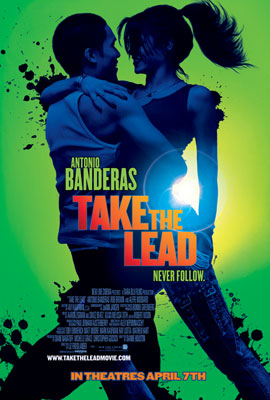
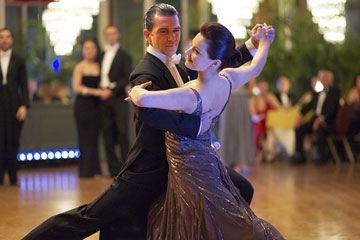 This "inspired by a true story" tale tells of Pierre Dulaine (Antonio Banderas), a courteous and mild-mannered dance instructor who seems immediately out of his element when he walks into a troubled inner-city high school one morning. Here is a place where the students must pass through metal detectors before even entering the hall, and the teachers have all but given up hope on every single teen that walks through the doors. He, on the other hand, is dressed formally and holds the door open for others. He has come this morning to report to the school's principal (Alfre Woodard) the identity of the teen who trashed her car over the past weekend. (An act he happened to have witnessed.) However, he leaves the building with a different purpose entirely. Seeing the principal's dwindling hope in the future of her own student body, Pierre suggests that he knows of a way to teach the teens discipline and respect - ballroom dancing. He is initially laughed off, but since the school needs someone to watch over after school detention, the woman decides to humor him, and give him a chance.
This "inspired by a true story" tale tells of Pierre Dulaine (Antonio Banderas), a courteous and mild-mannered dance instructor who seems immediately out of his element when he walks into a troubled inner-city high school one morning. Here is a place where the students must pass through metal detectors before even entering the hall, and the teachers have all but given up hope on every single teen that walks through the doors. He, on the other hand, is dressed formally and holds the door open for others. He has come this morning to report to the school's principal (Alfre Woodard) the identity of the teen who trashed her car over the past weekend. (An act he happened to have witnessed.) However, he leaves the building with a different purpose entirely. Seeing the principal's dwindling hope in the future of her own student body, Pierre suggests that he knows of a way to teach the teens discipline and respect - ballroom dancing. He is initially laughed off, but since the school needs someone to watch over after school detention, the woman decides to humor him, and give him a chance.What follows is your average underdog story. Pierre will slowly earn the respect and attention of his rowdy students, and teach them his philosophy on life, dancing, and achieving more than they thought possible. There's the inevitable personal drama of the teens (everything from bad home lives with uncaring parents to trouble with peer pressure from local gangs), there's the prerequisite character who does not agree with Pierre's philosophy and tries to get him fired or make him look like a fool (in this case, a teacher at the school who feels the students are doomed and Pierre is wasting his time), and most certainly there is the big dance competition where the students get their chance to shine and by the end, all the stuffy old white people who turned their noses up to them at the beginning of the film are now cheering them on. You could make a checklist of all the required plot elements that a movie like this needs to have before walking in, and by the end, probably have every item crossed off. But, what Take the Lead lacks in originality and story telling it makes up for in pure energy.
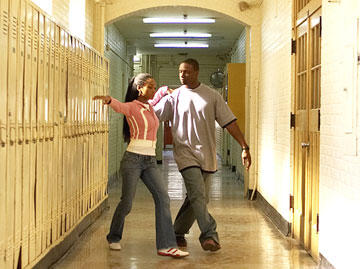 A lot this energy has to do with the dance sequences which are expertly choreographed, but not so much so that you have a hard time believing that these are the same kids we saw at the beginning of the film. They don't suddenly develop moves that only someone who has been dancing all their lives in the short time frame that the film is set in. For this, I am grateful. The dance sequences obviously got the most amount of attention, and it shows, because it is during these scenes that the movie is at its best. First-time filmmaker Liz Friedlander has past experience directing music videos, but she wisely does not rely on overly choppy editing techniques and other such tricks that so many other video directors fall into when they turn to making full-length films. She understands how to choreograph the music sequences in a realistic and exciting way. I can understand why the dance sequences got the most amount of interest, and I guess it's to be expected. But, when you look at the non-musical related scenes, it's almost like looking at two different movies.
A lot this energy has to do with the dance sequences which are expertly choreographed, but not so much so that you have a hard time believing that these are the same kids we saw at the beginning of the film. They don't suddenly develop moves that only someone who has been dancing all their lives in the short time frame that the film is set in. For this, I am grateful. The dance sequences obviously got the most amount of attention, and it shows, because it is during these scenes that the movie is at its best. First-time filmmaker Liz Friedlander has past experience directing music videos, but she wisely does not rely on overly choppy editing techniques and other such tricks that so many other video directors fall into when they turn to making full-length films. She understands how to choreograph the music sequences in a realistic and exciting way. I can understand why the dance sequences got the most amount of interest, and I guess it's to be expected. But, when you look at the non-musical related scenes, it's almost like looking at two different movies.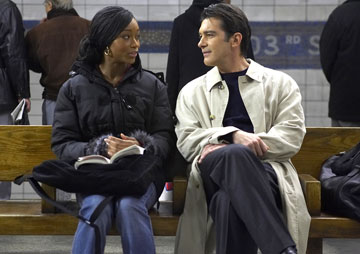 When Pierre's students are not gliding across the dance floor, they are stuck with the same tired old inner-city cliches that we've been seeing for over 15 years now. I wouldn't mind this so much if it was done well, but the scenes are sometimes so over the top and cheesy that I was shaking my head. I kind of got a sense of where the film was going early on when one of the troubled students trashes the principal's car with a baseball bat. The action is slowed down, and we hear his cries of anger intensified and muffled so that he sounds like a cross between a caged lion and The Incredible Hulk. Likewise, a scene where the same kid finally confronts his former gang member friends, deciding he wants to go to the ballroom dancing competition instead is about as realistic as subtle and realistic as finding a two-headed bear in the woods. Mind you, I haven't even mentioned yet that his friends seem to beat the life out of him when he takes his stand, yet just a couple scenes later, he shows up at the competition and dances up a storm, the movie never explaining how he recovered from his injuries that caused him to fall into unconsciousness the last time we saw him, or how he escaped from the approaching police presence. There are many scenes where the inner-city melodrama is piled on so thick that the movie just becomes downright odd. Most odd of all is the film's final scene, which I dare not spoil the pleasure of, but I will say revolves around the entire crowd at the ballroom competition (even the judges) dancing and clapping to hip hop music after the kids take over the competition's sound system.
When Pierre's students are not gliding across the dance floor, they are stuck with the same tired old inner-city cliches that we've been seeing for over 15 years now. I wouldn't mind this so much if it was done well, but the scenes are sometimes so over the top and cheesy that I was shaking my head. I kind of got a sense of where the film was going early on when one of the troubled students trashes the principal's car with a baseball bat. The action is slowed down, and we hear his cries of anger intensified and muffled so that he sounds like a cross between a caged lion and The Incredible Hulk. Likewise, a scene where the same kid finally confronts his former gang member friends, deciding he wants to go to the ballroom dancing competition instead is about as realistic as subtle and realistic as finding a two-headed bear in the woods. Mind you, I haven't even mentioned yet that his friends seem to beat the life out of him when he takes his stand, yet just a couple scenes later, he shows up at the competition and dances up a storm, the movie never explaining how he recovered from his injuries that caused him to fall into unconsciousness the last time we saw him, or how he escaped from the approaching police presence. There are many scenes where the inner-city melodrama is piled on so thick that the movie just becomes downright odd. Most odd of all is the film's final scene, which I dare not spoil the pleasure of, but I will say revolves around the entire crowd at the ballroom competition (even the judges) dancing and clapping to hip hop music after the kids take over the competition's sound system.It is a credit to the film's cast that they are able to rise above the ham-fisted dialogue and situations they have been given by the script, and still be able to rise above them, delivering strong performances all around. Antonio Banderas is quirky, wonderful, and immediately likeable in a very interesting role that breaks out slightly from the norm in this kind of film. He's mainly helping out the kids for fun. He's not a teacher, and he doesn't have any personal connection to the school or to the students, he volunteers his services, and spends his time enticing the troubled youth into his own world. It's a nice change of pace from the character type that usually headlines this genre. All of the kids portraying the students are good actors in their own right as well as excellent dancers, and are able to take just about everything the script throws at them. They may not make you forget how cliched their material is, or make you fully believe it, but they do make the film's worse moments easier to take.
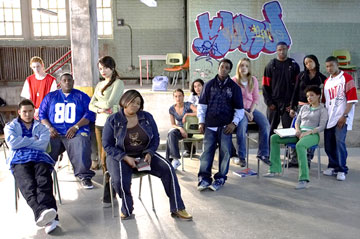
Take the Lead is the kind of movie I would probably hate if I was reading just the script alone. But thanks to a strong cast and good production values, the film is lifted up a little. Not quite enough for it to make me forget that I've seen this stuff many times before and done much better, but enough to make me walk out of such a convoluted and obviously desperate crowd-pleaser and not be angry. The film is ridiculous and has never met a cliche it didn't like, but it can also be fun when its focusing on the music instead of the storytelling. It's entertaining for the most part, inoffensive, and I'm sure it will have a long life on DVD and Cable television. That's probably all the filmmakers are looking for. Take the Lead is no Stand and Deliver, or even a School of Rock, but it knows how to give you a good time if you're in the right mind set when you watch it.
See the movie times in your area or buy the DVD at Amazon.com!






0 Comments:
Post a Comment
<< Home